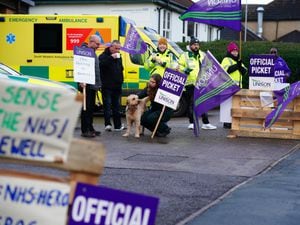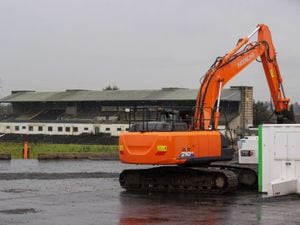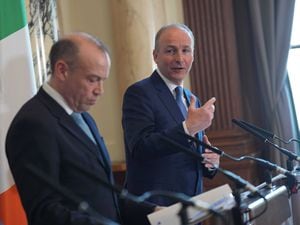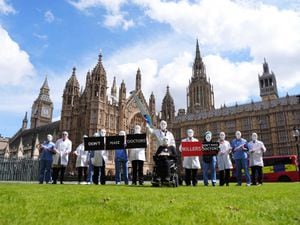Ambulance workers describe ‘demoralising’ NHS conditions as thousands strike
Paramedics, call handlers, drivers and technicians from the Unison and GMB unions were taking part in staggered strikes across a 24-hour period.

Ambulance workers have insisted the last place they want to be is on the picket line, as thousands went on strike for another day in the face of “disheartening” and “demoralising” conditions in the NHS.
Many involved in the walkout described regular hours-long waits to hand over patients from ambulances to the care of doctors and nurses, while some hospital corridors are said to have become “almost like wards”.
The descriptions of the obstacles facing healthcare workers on a daily basis came as up to 25,000 ambulance workers across England and Wales have gone on strike in a dispute with the Government over pay.
Paramedics, call handlers, drivers and technicians from the Unison and GMB unions were taking part in staggered strikes across a 24-hour period from Wednesday.
Fourteen health unions, representing more than a million NHS staff, have said they will not submit evidence to the NHS pay review body for the next wage round “while the current industrial disputes remain unresolved”.
Instead, the unions, which represent ambulance staff, nurses, porters, healthcare assistants, physiotherapists and other NHS workers in England, called for direct pay talks with ministers.
One paramedic on a picket line in Birkenhead, Wirral said the situation had “definitely got worse” in her seven-year career.
Jenny Giblin said: “Corridors are almost like wards. Sometimes you spend a whole shift on a corridor.
“It’s demoralising. I dread coming into work sometimes because I know what’s going to happen.”
Fellow Birkenhead paramedic Lisa McCabe said working conditions are “heartbreaking” as she described how it is “not unusual to stand in corridors for 12 hours without getting a break”.
She added: “Going on strike is the last thing we want to do but I think our voice needs to be heard.”
London Ambulance Service (LAS) worker Marcus Davis echoed that sentiment, saying he does “not want to be here” and hopes this is the “final day” of walkouts before a deal is reached.
One worker on a GMB union picket line in Nottingham, who wished to remain anonymous, said “the norm” is for ambulances to wait “for hours”.
She added: “It’s not pleasant getting to a job that’s possibly 24 hours old. It’s just really disheartening – going to a patient who has possibly been on the floor for 12 hours is just so disheartening.”
NHS Providers warned the health service would be hit harder by Wednesday’s strike than one held in December as more staff, including call handlers, took action.
Saffron Cordery, NHS Providers’ interim chief executive, said she expected pressure on service to “mount” during the day.
She told BBC Radio 4’s World At One programme that the NHS was able to “step forward and manage” through industrial action, but said it was having a “knock-on effect” on “waiting lists (and) treating people that need it in a timely fashion”.
Unison has balloted around 15,000 of its members who are striking in London, Yorkshire, the North West, North East and South West.
More than 10,000 GMB ambulance workers were also walking out, with their ambulance services covering the South West, South East coast, North West, South central area, North East, East Midlands, West Midlands, Yorkshire and Wales.
NHS England told patients to continue to call 999 for life-threatening emergencies but to use 111, GPs and pharmacies for non-urgent needs.
It said some people may be asked to make their own way to hospital, though it urged people to seek medical advice from 111 or 999 before doing so.
Speaking on Sky News, Health Secretary Steve Barclay said delays to ambulances were “clearly a concern as to the impact it has on patient safety”.

Asked about pay talks to break the current deadlock, Mr Barclay said he does not “think it is right” to “retrospectively” go back to April when it comes to reviewing this year’s pay offer to NHS staff.
It comes amid reports he is considering backdating any 2023/24 pay rise, due to be finalised in the spring, to this month in order to boost the current year’s settlement offer.
Ambulance responses are split into categories, with category 1 being the most life-threatening such as cardiac arrest, while category 2 covers conditions such as stroke, heart attack and sepsis.

No blanket agreement has been reached on responding to category 2 calls, with unions and trusts agreeing locally which category 2 calls will receive a response during the strike.
Mr Barclay condemned unions for failing to agree national minimum safety levels during strikes – something that would be fixed by legislation presented to Parliament on Tuesday.
Unison’s head of health Sara Gorton told the PA news agency that unions have been wanting to talk with ministers for more than a decade about putting minimum legal staffing requirements in place, without success.
The Government’s new focus on the issue appears to be an attempt to vilify health workers and a “distraction from the job in hand”, she said as she stood on the picket line outside the London Ambulance Service (LAS) headquarters in Waterloo.
She said the situation within the NHS seems to be “worsening day by day” and the “ball is in the Government’s court” to fix it.
In the Commons, the Prime Minister clashed with Labour leader Sir Keir Starmer over the new anti-strike bill, with Rishi Sunak saying: “No-one denies the unions’ freedom to strike but it is also important to balance that with people’s right to have access to life-saving healthcare.”





